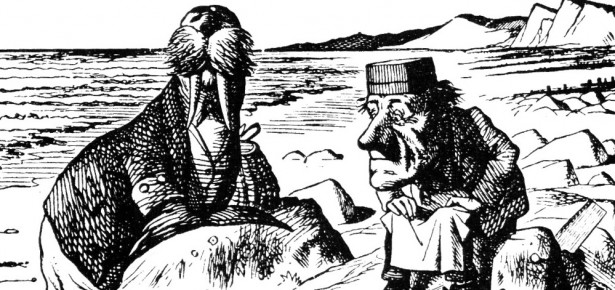
An illustration from Lewis' The Walrus and the Carpenter
“The time has come,” the Walrus said,
“To talk of many things:
Of shoes—and ships—and sealing-wax—
Of cabbages—and kings—
And why the sea is boiling hot—
And whether pigs have wings.”
Lewis Carroll, The Walrus and the Carpenter
Initially, I considered calling my book “Cabbages and Kings” but I soon realized that it might be mis-classified either as a cookbook or as a book about monarchy, or indeed, might be mistaken for a book about culinary recipes favored by members of the royal family.
Ironically, classification and mis-classification are what my book is about. Consideration of the ways in which we go about categorizing and taxonomizing individuals into various groups is a preoccupation that many philosophers have had. But philosophers are not just interested in how we actually do so, they are more interested in how we ought to do so. As with many questions, there is no clear line between is and ought. We cannot say how we ought to do so without taking a close look at how we actually do so, and any normative recommendations must take as their starting point actual practices. That is why I look at a range of taxonomic systems in my book, from fluid mechanics to psychiatry.
Classification is the basis of knowledge. Classifying things into categories enables us to generalize, explain, and understand.
Why should we care about classification? For one thing, classification is the basis of knowledge. Classifying things into categories enables us to generalize, explain, and understand. We sort things into taxonomic systems in order to know more about them, to understand why they have the properties that they do, and to predict how they are likely to behave in the future. If I classify a sample of liquid as a Newtonian fluid, I know that it will have constant viscosity for a given pressure and temperature, and it will therefore obey certain laws of fluid flow. If I classify a cell as cancerous, I know that it will divide and grow without limit, and it will tend to survive indefinitely, resisting the normal cycle of cell death. Moreover, questions of classification are often of great importance to us because of their practical implications. To mention just a few such questions that have surfaced in news headlines recently: Is Asperger’s Syndrome a legitimate psychiatric classification, or is it just a special case of autism? Is the categorization of individuals on the basis of race a legitimate means of sorting them, or is it a reflection of a discredited scientific theory?
Many philosophers have regarded social classifications, taxonomies pertaining to the human realm, as being starkly different from those that pertain to the natural world. But my book argues that there is no sharp divide between the natural and the social. Categories in the physical, chemical, biological, psychological, and social domains all aim to reflect causal patterns. It is true that, as systems become more complex and consist of a larger number of parts, our categories reflect causal relationships that are less strict, and our projections and predictions are less reliable. Atoms of lithium behave in precisely the same ways under a very broad range of conditions, whereas viruses, even those of a specific kind, may lead to different symptoms in different people or on different occasions. Humans diagnosed with Attention Deficit Hyperactivity Disorder (ADHD) behave even more variably. Though categories in the basic sciences are not strictly separated from those in the special and applied sciences, there are some significant differences. But whether we are studying the natural or social domains, I try to establish that there are few if any cases in which our categories reflect “essences” or essential properties.
One misconception about the difference between categories in the natural sciences and those in the social sciences, is that the latter are “socially constructed.” But I argue in my book that this common claim is seriously misguided. There is an obvious sense in which all our categories are constructed by human beings, but that does not mean that they are not objective or attempt to reflect real differences, whether in the natural or social sciences. Moreover, to say that the social world is itself socially constructed is trivial; social kinds, including kinds of social institutions, processes, and entities are constructed by human communities. But that does not mean that they are figments of our imagination. So the view I argue for is neither essentialist nor social constructionist.
Latest Comments
Have your say!